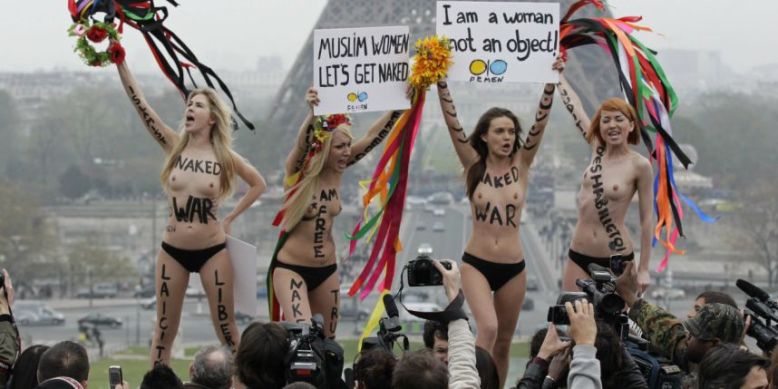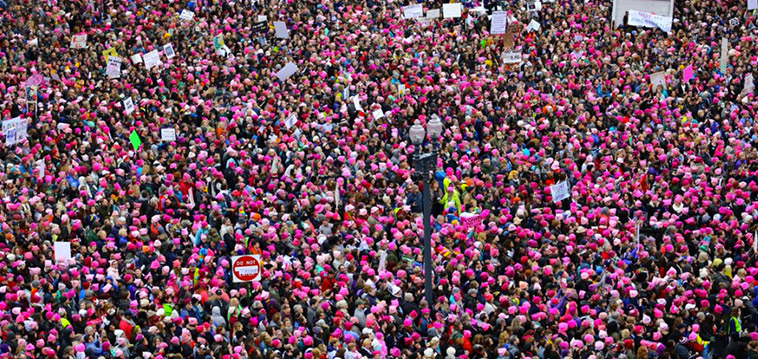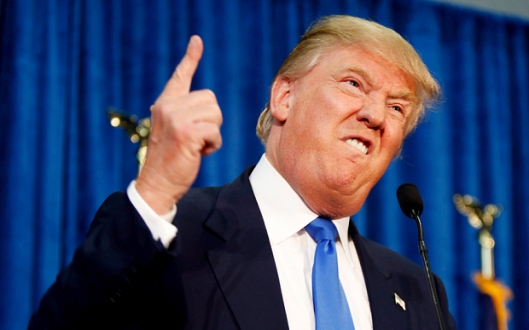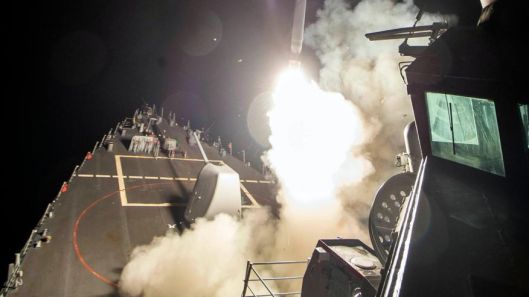 Today (March 8) is International Women’s Day. No doubt there will be numerous articles about women’s issues, women’s struggles and women’s triumphs. In this article I take a different route and address an issue that is rather taboo and off-limits, but ought to be discussed. Before I do, I want to stress that women in the west have come a long way and have a lot to be proud of. Western women have fought hard and bravely for rights and privileges that were denied to generations of women before them and have made vast strides towards greater equality and representation in society. For this, western women and traditional feminism should be applauded.
Today (March 8) is International Women’s Day. No doubt there will be numerous articles about women’s issues, women’s struggles and women’s triumphs. In this article I take a different route and address an issue that is rather taboo and off-limits, but ought to be discussed. Before I do, I want to stress that women in the west have come a long way and have a lot to be proud of. Western women have fought hard and bravely for rights and privileges that were denied to generations of women before them and have made vast strides towards greater equality and representation in society. For this, western women and traditional feminism should be applauded.
At the same time, the version of feminism that presently functions in the west—liberal, consumer, mainstream feminism—has become problematic. That is what I wish to address in this article. I want to honestly address the issue of women. I don’t mean “women’s issues”; those have been discussed at length. I mean the issue with women, meaning the problem with certain segments of the female population in the west, namely: liberal, mainstream, consumer feminists. Before you bring out the PC (politically correct) lynch mob, please read on to understand what I mean by this.
There is a segment of the female population in the west today that is very puzzling and frustrating, especially to traditional or former left-wingers, such as myself.1 I am referring to the slut marching, pussy rioting, liberal consumer feminists that fancy themselves progressive or liberal or “left wing,” today. These are the women that fight the sexual objectification of women by sexually objectifying themselves (topless FEMEN protestors anyone).2 Or the women that talk about ‘girl power’ then turn around and applaud when a Woman of the Year Award is given to a male-turned-female woman. Or the women that think revering and emulating cheesy, female pop stars—like Madonna or Beyonce or Niki Manaj—makes them ‘fierce feminists.’
While they may think themselves politically avant guarde, many of these women come off as rather apolitical and seem to have purchased ‘feminism’ as a media constructed/promoted lifestyle; hence the term consumer feminists. Their ‘feminism’ or girl power is reflected largely in the products they purchase or the lifestyle choices they make. These consumer feminists mistake buying Activia yogurt (a product marketed solely to women) or practicing yoga (in stylish and expensive yoga outfits) for being political or “progressive.” Newsflash ladies: these are lifestyle choices, not political acts or movements.
Western Liberal Feminism and the US Presidential Election
And when these liberal, consumer feminists do attempt to tackle politics or political issues, it is often done through reactionary identity politics, which substitutes the personal—personal identity, personal feelings, etc—for the political in a manner that negates broader politico-economic understanding and analysis. For instance, women that support candidates like Hillary Clinton simply because she is a woman—despite her many political and geopolitical crimes and blunders. Mired in identity politics, their femaleness forces them to support a female candidate simply because of her sex, while ignoring her political actions and behaviour; however heinous it may be.
This reflects one of the many follies of identity politics: It excuses the crimes of people like Hillary Clinton and Barack Obama–which includes the slaughter of innocent women and people of colour all over the world–based on their gender or race. As I argue elsewhere, it is not rational to support a president or presidential candidate simply because they are a racial minority or a woman. And I say this as a female racial minority.
Nor is it constructive to build a “political” protest movement centred mainly on feelings of personal offense. A few days ago I was offered a pink hat with cat-shaped ears on it (the “pussy hat,” as it is being called), to wear as a symbol of “women’s resistance to Trump.” The pussy hat is part of the Pussyhat Project, a project begun by two American women following the 2016 US election. According to Business Insider, the hat’s name was inspired by Trump’s 2005 comments in the Access Hollywood audio leaked in October 2016, “in which he bragged about grabbing women by their genitals.”3
 According to one of its co-founders, the Pussyhat Project is “about women refusing to be erased from political discussion,” reports Business Insider. While I am not sure exactly what she means by this, it seems to suggest that given that Hillary Clinton is a woman, and given that she lost the election, women—especially those women that voted for Hillary Clinton—are now being “erased” from political discussion. That does not make much sense. Are we to believe that Hillary Clinton lost the election because she is a woman? Last year in the UK, a female Prime Minister, Teresa May, was voted in and replaced the former male Prime Minister, David Cameron. Does that mean that men in the UK are being “erased” from the political discussion?
According to one of its co-founders, the Pussyhat Project is “about women refusing to be erased from political discussion,” reports Business Insider. While I am not sure exactly what she means by this, it seems to suggest that given that Hillary Clinton is a woman, and given that she lost the election, women—especially those women that voted for Hillary Clinton—are now being “erased” from political discussion. That does not make much sense. Are we to believe that Hillary Clinton lost the election because she is a woman? Last year in the UK, a female Prime Minister, Teresa May, was voted in and replaced the former male Prime Minister, David Cameron. Does that mean that men in the UK are being “erased” from the political discussion?
While there is a disproportionate amount of men in western politics in general, this did not begin with the 2016 US election, and statements about women being erased from political discussion need to be politically and historically situated and qualified. The Pussyhat Project and the sea of pink at the “Women’s March on Washington D.C.” on January 21 (the day after Trump’s inauguration), with thousands of women adorned in fuzzy pink ‘pussy hats,’ served to confirm something I have thought for many years now: That western women—especially liberal, consumer ‘feminists’—are extremely conformist and easy to manipulate as well as contradictory.
Where was the female indignation during the eight years of the Obama administration, when Obama and a female Secretary of State (in the first four years) repeatedly and systematically war mongered and deployed drones to kill scores of innocent people overseas, many of them minorities and women? Where was their women’s march on Washington, D.C. then? It simply did not exist. There were no mass women’s marches or female protest movements against the previous US administration, despite its myriad political, economic, and geopolitical crimes and atrocities.
While the Obama administration was among the most imperial and war mongering in US history, continuing and intensifying many of the policies of the George W. Bush era, and while Obama failed to keep any of his campaign promises, such as his promise to close Guantanamo Bay or to end the war on terror, there was no mass female uprising against him and his administration. Of course, during the Obama administration, the mainstream media were its biggest cheerleaders. The media was not helping to “trigger” women and rile them up as they are at present.
But protesting topless or wearing a pink hat does not, in and of itself, make you political. At best it makes you a cliché and, at worst, it makes you controlled (or fake) opposition. For there is nothing genuinely political or oppositional about following a herd trend, even if that trend is said to be a political statement or a “symbol of political resistance.”
Identity Politics is a Diversion From Bigger Issues
Identity politics is a form of political capitulation that gives into the establishment. It is a distraction from, and substitution for, a failed economy and a failed political system. Identity politics replaces political and economic power and choice, or lack there of, with personal choice and personal empowerment. The personal freedoms granted under identity politics—for instance, the freedom to choose among the ever-growing number of genders, etc—can mask how politically and economically un-free and powerless we are.
Under the present global neocon/neoliberal politico-economic mono-culture, people are increasingly politically and economically disenfranchised and dis-empowered. Rather than focus on the ever-creeping economic collapse, escalating unemployment, political dis-empowerment, the growing police and surveillance state, and the general economic despair that plagues much of the world’s population, identity politics (and contemporary progressives in general) points our attention towards differences, personal identity and personal choice. How convenient for the global power structure/elites. This is especially true among that segment of the western female population—liberal, consumer ‘feminists’—that I describe above.
Western Liberal Feminists are Largely Apolitical

While Donald Trump’s misogynistic comments may warrant criticism, the problem with pussyhat wearing mainstream/consumer feminists is that they protest against him largely because they are personally offended. These women are apolitical in the broader, general sense. While they are raging against the pussy-grabbing Trump, they are silent on—if not oblivious of—the myriad other political, economic, and geopolitical problems and crises that plague humanity at present.
If these women were truly politically or critically minded, they would not have rallied behind the likes of Hillary Clinton or Barack Obama. This is not about “defending Trump,” but about pointing out that a lack of political perception and critical analysis makes many ‘feminists’ blind to the crimes of the previous US administration as well as to the globalized, militarized, neoliberal/neocon politico-economic power structure in general.
Western, liberal mainstream/consumer feminism is different than radical feminism, socialist feminism, and, especially, third world feminism. This topic is too complex to address here. For now I merely wish to note that much of what passes for ‘feminism’ in the west today would potentially be questioned by veteran feminists and/or more political and class-based understandings of feminism as well as by third world feminism.
For instance, unlike many western feminists, who tout gender neutrality and the “anything you can do, I can do better” mentality, “African feminists do not attempt to rob the man of his value and worth. They simply want to be given value and worth, as well.” As Dr. Hildra Tadria of Uganda, member of the African Women Leaders Network (AWLN) and co-founder of the African Women’s Development Fund explains, “For us, the fight is to dignify what the African woman does, not to try to get her to do what the African man does.” 4
For African feminists one of the most curious aspects of western liberal feminism is its emphasis on “sexual liberalization” or hyper-sexuality. Most third world feminism is not about sexual freedom but freedom from over sexualization and over objectification. While mainstream western feminists often use the term “rape culture” to describe the west, there are many countries in the world wherein women do indeed live under the constant threat of rape–where rape and sexual violence are rampant and ignored by the state. For these women, feminism includes the desire and struggle to be less sexualized.
Ironically, while contemporary western ‘feminists’ also claim to oppose the sexual objectification of women, they often employ sexual objectification as a tool to fight or denounce it (see the slim and sexy FEMEN protesters in the picture above). While this tactic may be aimed at reclaiming the female form and female sexuality, it is ultimately counter-productive in a society where the naked form (both male and female) is still seen as sexual. Protesting topless or naked takes attention, especially media attention, away from the issues these women are protesting, and focuses it instead on bare breasts and naked bodies. Here, the image ultimately distracts from—and upstages—the message.
I am aware that criticizing these types of women may be seen as catering to the divide and conquer tactics of the power establishment on some level; since we should seek to unite with others, not criticize them. But the liberal feminism of the fake left has reached a point of absurdity and counter-productiveness that simply cannot be ignored. And western women have to have the courage to call it out.
While wearing a fuzzy ‘pussy hat’ or slut marching topless may be said to be a symbol of ‘resistance;’ I ask, resistance to what? It most certainly is not resistance to globalist power or the US establishment. Let us not forget that, prior to Trump’s victory, there was very little anti-government dissent among so-called feminists and progressives in the US. Nor was there much resistance or opposition among them to the imperial war machine and western interventions abroad, which was as robust as ever—if not more robust—under the supposed feel-good regime of Barack Obama and his sidekick, Hillary. Indeed many on the new/fake left (including liberal feminists) support these imperial, regime change interventions, in the name of liberating oppressed women or protecting human rights,etc.
Final Thoughts
It appears that second and third wave western feminism has degenerated into something that is at once apolitical (or faux political), consumerist, and a service to the global establishment. In the midst of the feel-good, reactionary spectacle of contemporary western feminism, there seems to be very little that is political or left wing in the traditional sense, meaning politics and protest that is critical of hegemonic power, Empire, imperial wars, economic collapse and despair, unemployment, and class issues.5 You know, all those “old fashioned” and un-hip issues that the left used to care about before identity politics took over and/or forced its way in.
It also appears that contemporary ‘feminists’ have been manipulated through marketing and mainstream media and sold a clichéd lifestyle as politics and political opposition. Yet, as mentioned above, their form of politics—i.e., identity politics—actually serves the establishment inasmuch as liberal feminists, and liberals or ‘progressives’ in general, readily support imperial wars, policies and interventions. In this way, these groups have (unwittingly) become pawns and proxies of the global politico-economic power structure.
While the personal may be political, it will never be more political than actual politics and political consciousness. In reality, identity politics is the opposite of politics, in that, traditionally, politics or public engagement dealt with common issues, whereas identity politics further fragments consensus and is extremely divisive. Identity politics–women competing with men or racial groups pitted against one another–reflects the divide and conquer desires and strategy of the elite, since the masses are always weaker when they are divided. It forces a false polemic that stands in the way of consensus building, collective identity, and unity. As the old activist saying goes, “the people united will never be defeated.” Identity politics flies in the face of this and does the exact opposite; it divides people at a historical juncture when unity is most urgently needed.
Western liberal feminism has succumbed to the divisive and diversionary agenda of identity politics. I for one am not moved by the media-driven, diversionary spectacle of women in pink hats or topless FEMEN protestors, which is reactionary and provocative but lacking in deeper political thought and analysis. Like so much else on the establishment or fake left, it reeks of simulacra, or, put another way, it is more spectacle than substance.
So you can keep your pussyhat, ladies, this woman has more on her mind than what’s between her legs.
Notes
1 I no longer use the term left wing due to identity politics. It should also be noted that I do not identity as a feminist. If I had to use a label it would be anti-imperialist humanist.
2 I am not “shaming” women for going topless but simply pointing out the contradiction of doing so in order to oppose the sexual objectification of women.
3 While misogynistic comments—such as those made by Trump—may warrant criticism, he made those comments privately. As Hillary Clinton once told a group of Wall Street banking executives in an email exchange leaked on wikileaks, “you need both a public and private position.” I’m sure Hillary’s husband Bill’s private “position” on women would be even more shocking than Trump’s. Bill is a notorious womanizer and his private comments on women and their bodies would likely leave many horrified.
4 http://www.newdmagazine.com/apps/articles/web/articleid/76478/columnid/default.asp
5 Today class is not just about money or income, nor is it simply about the means of production. Today class it is arguably equally about, if not more about, similarities in the way people live and the things they do.








 Today (March 8) is International Women’s Day. No doubt there will be numerous articles about women’s issues, women’s struggles and women’s triumphs. In this article I take a different route and address an issue that is rather taboo and off-limits, but ought to be discussed. Before I do, I want to stress that women in the west have come a long way and have a lot to be proud of. Western women have fought hard and bravely for rights and privileges that were denied to generations of women before them and have made vast strides towards greater equality and representation in society. For this, western women and traditional feminism should be applauded.
Today (March 8) is International Women’s Day. No doubt there will be numerous articles about women’s issues, women’s struggles and women’s triumphs. In this article I take a different route and address an issue that is rather taboo and off-limits, but ought to be discussed. Before I do, I want to stress that women in the west have come a long way and have a lot to be proud of. Western women have fought hard and bravely for rights and privileges that were denied to generations of women before them and have made vast strides towards greater equality and representation in society. For this, western women and traditional feminism should be applauded. According to one of its co-founders, the Pussyhat Project is “about women refusing to be erased from political discussion,” reports Business Insider. While I am not sure exactly what she means by this, it seems to suggest that given that Hillary Clinton is a woman, and given that she lost the election, women—especially those women that voted for Hillary Clinton—are now being “erased” from political discussion. That does not make much sense. Are we to believe that Hillary Clinton lost the election because she is a woman? Last year in the UK, a female Prime Minister, Teresa May, was voted in and replaced the former male Prime Minister, David Cameron. Does that mean that men in the UK are being “erased” from the political discussion?
According to one of its co-founders, the Pussyhat Project is “about women refusing to be erased from political discussion,” reports Business Insider. While I am not sure exactly what she means by this, it seems to suggest that given that Hillary Clinton is a woman, and given that she lost the election, women—especially those women that voted for Hillary Clinton—are now being “erased” from political discussion. That does not make much sense. Are we to believe that Hillary Clinton lost the election because she is a woman? Last year in the UK, a female Prime Minister, Teresa May, was voted in and replaced the former male Prime Minister, David Cameron. Does that mean that men in the UK are being “erased” from the political discussion?